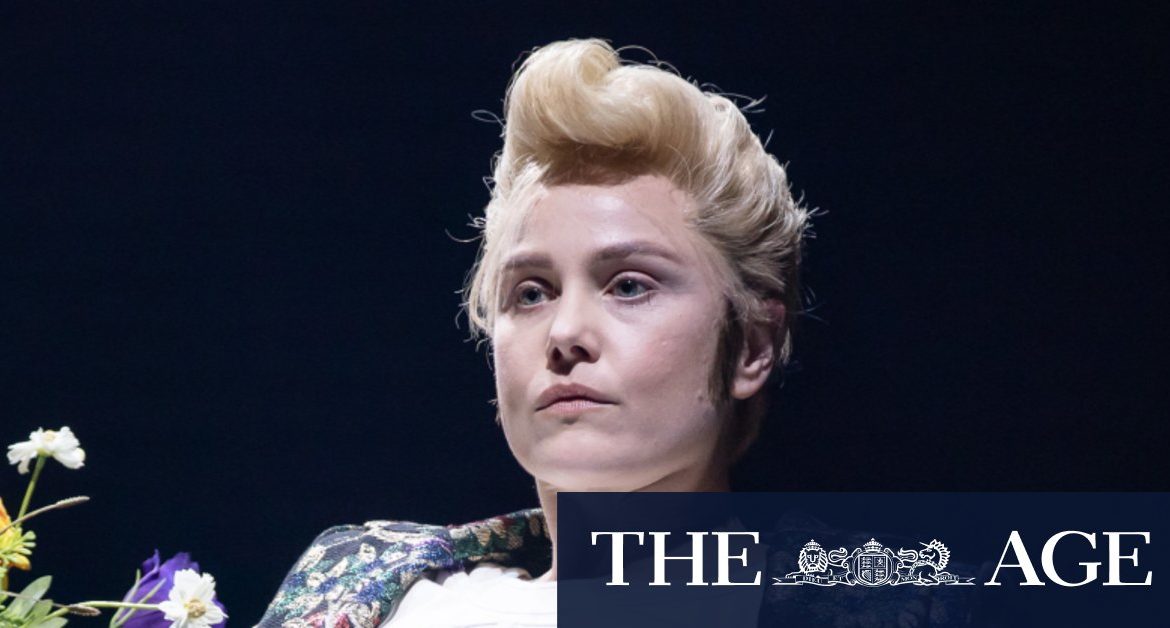Eryn Jean Norvill in Sydney Theatre Company’s A Picture of Dorian Gray.Credit:Dan Boud
It’s not just the screens’ content: the actual process of the live videoing becomes theatrical in a Brechtian way. At one point two camera operators dance with actor Eryn Jean Norvill, who elsewhere exchanges on-stage asides with those fussing over her wigs and moustaches.
Moustaches? Yes, this tale of an impossibly beautiful bisexual young man has Norvill playing every role. To facilitate this, Williams gradually expands the production’s technical scope from a live Norvill seen on screen as the narrator, artist Basil Hallward and his friend Lord Henry Wotton, to her interacting with pre-recorded videos of herself playing no less than 26 characters.
That’s tricky to pull off, and sometimes the timing of the interaction was slightly askew, and, further complicating it, Norvill was not always fully secure in her lines. Yet somehow these lapses blended into the Brechtian nature of our watching a process simultaneously with an outcome.
When Dorian first sees the life-changing portrait, it is us, the audience, upon whom he gazes, and later, when he shrouds the shocking canvas, it is a camera over which he throws the fabric. Williams realises the Romeo and Juliet sequences involving Dorian’s actor-fiancee, Sibyl, with puppets, before her love for Dorian undoes her thespian art, whereupon the real Norvill’s acting is magnificently bad. In a masterstroke, the usual static effect of screens is negated by having them fly up and down and track horizontally, and, in the opium-den sequence, they incorporate marvellously grotesque distortions.
Not only is this Williams’ finest work as an adaptor and director, it is Norvill’s as an actor. Her sonorous voice (amplified in this cavernous space) knits with Wilde’s opulent language, and nearly every character, male or female, is so rounded and real you can almost smell them. Crowned with a curly blond wig, she is a gorgeous personification of the boyish Dorian, whom Wotton’s sly words open up as time does the petals of the yellow rose with which Dorian poses. This is the same yellow as the “poisonous” book Wotton gives him, which magnetises his moral compass, while cementing in his psyche the potential for a life that’s an endless sensory odyssey. Once he begins to stain his soul with the indelible ink of sin, Norvill is remade with hair and clothes reminiscent of Liberace.
Wilde once wrote that “Basil Hallward is what I think I am: Lord Henry is what the world thinks of me: Dorian is what I would like to be in other ages, perhaps.” He was wrong: he was a greater artist than Basil, a greater wit than even the droll, detached Henry, and an infinitely better man than Dorian. Williams, Norvill, designer Marg Horwell, composer Clemence Williams, David Bergman (video), Nick Schlieper (lighting) and the rest of the team (including 12 on-stage technicians) have brought Wilde’s extraordinary tale to throbbing, violent, beautiful, disturbing and magical life.
Until December 19.







